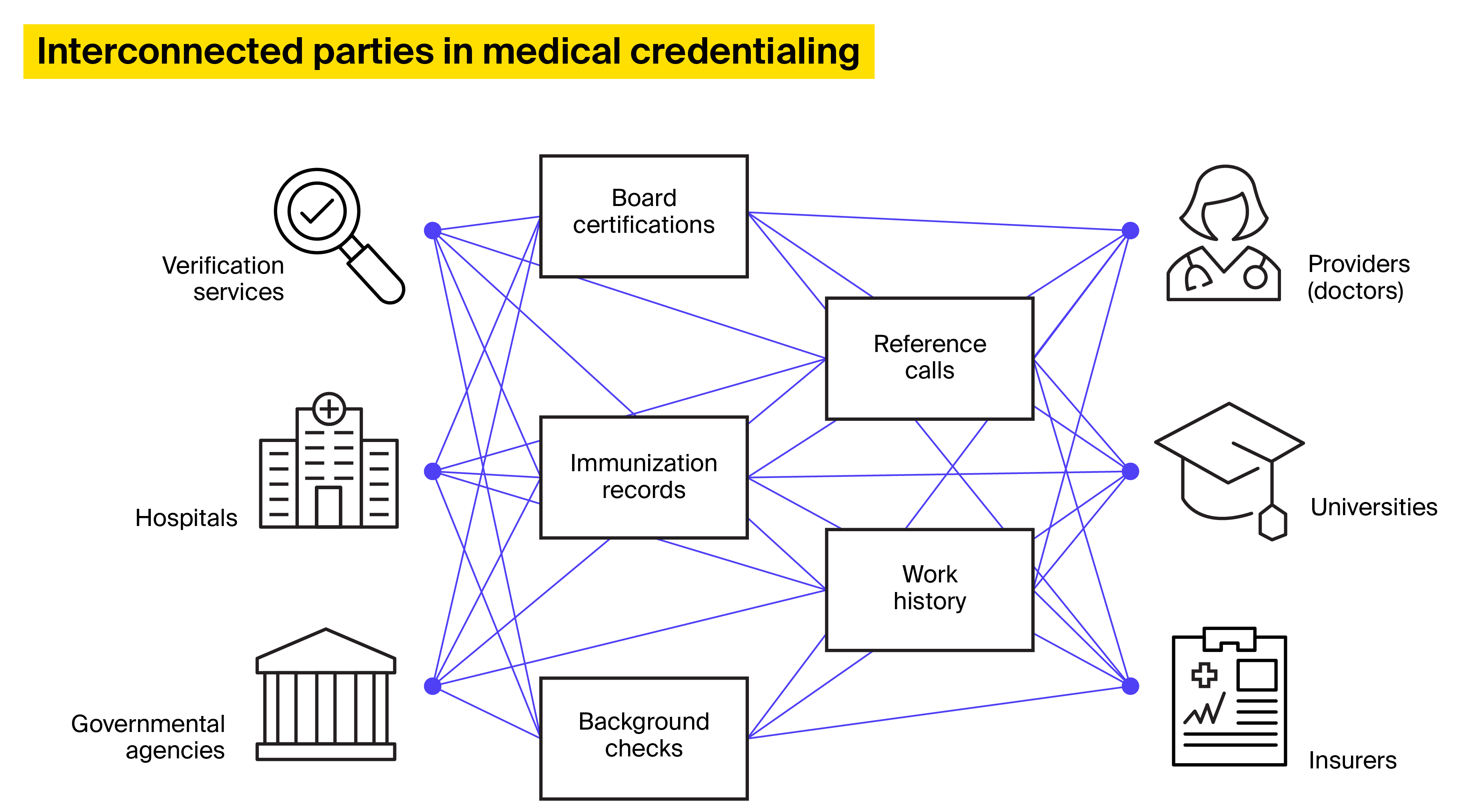What is blockchain, and how does it benefit healthcare?
Blockchain is a decentralized distributed system that generates and stores data. When one device on a blockchain performs a transaction, all other devices generate identical blocks reflecting this action. Similarly, when blockchain data is manipulated in any way, a block is created to record this information so that any change can be easily verified and tracked back to its source.
You can learn more about blockchain and its applications in a dedicated article on our blog.
How can blockchain be used in healthcare? This technology incorporates advanced cryptography mechanisms to enhance data security. With blockchain’s permission system, it gives data ownership back to the individuals, and with its transparency, it facilitates clinical trials by documenting and time stamping all the details. Furthermore, it offers unique contract management and payment capabilities.
Advantages of blockchain in healthcare
Here are the main benefits blockchain technology brings to different healthcare actors:
Blockchain for healthcare organizations:
-
Improves decision making as blockchain allows several doctors from different location to view the same data in real time
-
Transforms patient medical records to a decentralized system that can’t be tampered with
-
Speeds up medical credentialing
Blockchain for patients:
-
Empowers patients to assume ownership of their medical data
-
Supports consent mechanisms prohibiting healthcare providers from accessing information without patient permission
-
Enables patients to participate in research and otherwise monetize their data without intermediaries
-
Collects and stores data from wearable devices in a secure manner
Blockchain for pharmaceutics:
-
Helps to recruit participants for clinical trials
-
Supports reliable and auditable documentation of clinical trials with its immutable records
-
Allows spotting counterfeit drugs
Blockchain for insurance:
-
Speeds up confirmation obtaining process
-
Unlocks the opportunity for insurers to draft and manage agreements using smart contracts
-
Cuts down costs by eliminating intermediaries
Disadvantages of blockchain in healthcare
There are several disadvantages to adopting blockchain in healthcare stemming from the nature of this technology:
-
As the number of blocks grows, the transaction time increases, causing delays
-
Inability to permanently delete records. The network simply creates more blocks that reflect the invalidation of existing records
-
For this technology to function, every involved organization needs to be on board with it
-
Potential problems with large patient files, such as MRI scans
-
High planning, developing, and maintenance costs
Blockchain in healthcare: use cases
Here are seven of the most prominent blockchain technology applications in healthcare:
-
Transparent supply chain
-
Faster medical credentialing
-
Patient-centered EHRs
-
Manageable medical trials
-
Enhanced security
-
Commitments enforced via smart contracts
-
Genomic research
Blockchain increases healthcare supply chain transparency
Counterfeit drugs are a persistent problem. The World Health Organization (WHO) estimates that up to 1% of all medications available for purchase in the developed countries are not legitimate. This number increases in the developing countries to reach almost 10%. Proving this point, the Drug Enforcement Administration (DEA) captured over 9.5 million fake medications in the US in 2021. The agency reports this number is higher than it was in two previous years combined.
One of blockchain’s use cases in healthcare is that it allows customers to track the products at every stage, including manufacturing, wholesale, and shipping to make sure the items are legitimate. This is crucial for both drugs and medical devices. Once a ledger is created for a drug, it records the point of origin, a laboratory for example. Since then, every manipulation on this drug is documented. Blockchain can incorporate rather extensive information, such as labor costs and how much waste was emitted during manufacturing and transportation.
MediLedger is an example of a blockchain protocol that healthcare organizations can use to verify information on prescription drugs’ supply chain. This includes expiration dates, manufacturers, etc. MediLedger also allows different parties to exchange secure peer-to-peer messages. Many prominent healthcare providers, such as Bayer, Pfizer, and Cardinal Health use this network.
In another example, Paris-based Blockpharma built a solution that scans medications’ supply chain and verifies it across all points of shipment. The company’s app allows patients to verify the legitimacy of their purchase. Blockpharma is believed to intercept 15% of counterfeit drugs worldwide.
Blockchain speeds up medical credentialing
Verifying credentials – training, skills, medical licenses, and education – is a tedious process that is typically performed via phone and email and can take up to four and even six months to complete. The Council for Affordable Quality Healthcare reports that payers spend almost $2 billion per year to maintain a comprehensive healthcare provider database. Blockchain technology can offer a faster and more reliable substitute that doesn’t rely on direct human references.
Blockchain allows healthcare organizations to log and monitor the credentials of their staff. This arrangement streamlines the hiring process and improves transparency and trust between subcontractors, hospitals, and patients. Additionally, blockchain records allow incremental updates when professionals need to add qualifications.
ArchiveCore is a healthcare credentialing startup founded by two physicians. It uses blockchain to verify primary source credentialing documents with the aim to reduce time on new hires’ background check. Carilion Clinic tested ArchiveCore software against their typical hiring process for 17 staff members and was amazed to discover that they could have saved $1.2 million in lost revenue.
Blockchain enables patient-centric EHRs
Sharing medical data is a sensitive and highly-regulated task. A survey conducted among physicians and nurses in the US reveals that 74% of the respondents believe that patients’ safety is at risk when exchanging their health information among different departments.
One of the most popular blockchain use cases in healthcare is to offer a comprehensive overview of patients’ records and manage data sharing consent. Such systems give patients full control over their records – they are notified when their data is updated, and they can share full or partial records with doctors, researchers, and other parties. Patients can even set a time limit on how long their records are visible to a particular third party. Insurers can use this system to validate confirmations with patients directly, without intermediaries.
One application of the technology comes from MedicalChain. This company helps healthcare providers integrate their electronic medical records with a blockchain-powered platform. MedicalChain software can be used to develop other healthcare solutions, such as virtual consultations and marketplaces that enable patients to monetize their anonymized medical data.
Blockchain facilitates clinical trials
ClinicalTrials.gov reveals that drug development costs around $350 billion globally per year. Clinical trials produce large amounts of data and involve many people, such as sponsors, study subjects, doctors, researchers, drug manufacturers, etc. Hence, mistakes can occur easily and there is room for intentional falsification. Finding and recruiting participants is another issue. A recent report shows that only 8% of cancer patients participated in clinical trials. Also, trails’ information is typically stored in centralized databases, making it challenging to share among all stakeholders.
Another blockchain use case in healthcare is to make clinical trials more transparent, allowing researchers to identify studies with questionable protocols and prevent their publication. With this technology, all clinical trial documents can be time stamped and securely stored. Blockchain records include project proposals, surveys, research design, blood tests, patient consent forms, etc. Moreover, this technology allows participants in dispersed geographical locations to view the data simultaneously in real time, which is crucial for trial decision making.
Additionally, blockchain can help manage clinical trials’ finances. For example, the German pharma company Boehringer Ingelheim teamed up with IBM to implement a blockchain-based bookkeeping system for its trials. Delayed payment of trials’ participants is another issue. It typically takes several months for those people to receive income. Bloqcube specializes in blockchain-powered clinical trial software and it believes that working with central bank digital currencies can significantly speed up the payment process, allowing doctors and patients to receive compensation a few minutes after performing a task.
Blockchain enhances security
Health data is mostly stored on centralized databases which cannot offer adequate protection against theft and breaches. According to HIPAA Journal, a total of 44,993,618 medical records were compromised in 2021 across 686 healthcare data breaches.
Blockchain can facilitate secure health data storage and sharing. For example, Akiri, headquartered in California, operates as network-as-a-service and uses blockchain to offer a set of policies, configure data layers, and verify health data source and destination in real time.
Blockchain also supports encryption. If healthcare providers want to access patient information, they will need the corresponding public key. Research shows that 63% of healthcare organizations fail to encrypt the protected health information (PHI) residing on their workstations. Testd, a major US-based test and vaccine verification platform resorts to blockchain to encrypt its data and further anonymizes it.
Another security-related use case of blockchain in healthcare is supporting wearable medical devices. This technology facilitates recording and safe transmission of IoT data from devices to healthcare providers. It can protect the data from unauthorized tampering, block access to certain devices, and shut down compromised nodes.
Blockchain enforces commitments via smart contracts
Contract-related disputes and failure to honor contract terms is a problem in every industry. Research shows that 10% of insurance claims are disputed in the medical sector, while 17% of claims are being denied due to reasons such as incomplete information, duplicate claims, improper registration, etc.
Smart contracts can offer a solution to these daunting problems.
A smart contract is a piece of code deployed on a blockchain. It is set to be executed automatically when predefined conditions are met. Smart contracts help the medical sector to cut down on costs by eliminating intermediaries.
This technology enables different healthcare actors, such as providers, patients, insurers, and medical device manufacturers. to authenticate themselves on the network and document contract clauses, which will be carried out automatically and will remain visible to all parties involved. For example, when a patient visits a doctor, this event will be reflected in the blockchain ledger, and the insurer will be notified. Stakeholders can turn to smart contracts to verify facts and speed up dispute resolutions.
Curisium, recently acquired by Philadelphia-based HealthVerity, developed a blockchain-powered platform that supports contract management and negotiation in the healthcare sector. It allows providers and payers to participate in innovative secure contracting arrangements and find common grounds in case of a dispute.
Blockchain enables genomic research
The costs of genomic sequencing sharply decreased from $10,000 a few years ago to $1,000 nowadays, with some companies claiming to perform this task for solely $100. This encourages scientists to engage in genome-related research. But where to find willing participants? And how to provide secure storage for such massive datasets?
Here is another blockchain use case in healthcare. This technology allows participants to store billions of genome data points, exchange them securely between interested parties, and establish ownership. The technology also supports individuals in legally monetizing their genomic information without involving intermediaries.
For example, EncrypGen offers a blockchain-enabled DNA marketplace where participants can upload, share, search, and sell genetic data using traceable DNA tokens.
In another instance, the Israeli biotech company DNAtix demploys blockchain to facilitate genomic data exchange between data owners and researchers by using DNAtix tokens as means of payment. The company takes pride in fully anonymizing payments and contracts. Here is what the company’s CEO, Ofer Lidsky says, “We are bringing a new possibility of participating in research, testing your DNA, storing your DNA, and staying anonymous. It’s the safest genetics on the planet that will be available.”

-
Compliance with HIPAA and other data privacy regulations: blockchain stores and maintains highly sensitive and regulated patient data on a network that is designed to be transparent. Healthcare organizations need to make sure they are compliant, and the risk of data exposure is minimized.
-
Large volumes of healthcare data: medical facilities will need to evaluate the possibilities of storing enormous amounts of data without compromising heavily on the performance.
-
Finding the right balance: we can’t maximize blockchain security, scalability, and decentralization simultaneously. One of those parameters is improved at the expense of the others. For example, if blockchain is scaled in a way that its payment system is adopted globally, the security of handling those transactions is likely to be compromised. Researchers are looking for solutions, but at the moment, this remains a relevant concern.
-
Access authorization: another challenge of blockchain in healthcare is that data access is based on permissions. But what to do if a patient physically can’t give explicit consent in case of emergency? Organizations will have to come up with protocols on how to operate in this and similar situations.
-
Private and public keys: blockchain uses cryptography to secure its data. Hence, there is an issue of key management. Using the same public key for all blocks implies that all the data would be exposed if the key is compromised. On the other hand, using a different key for each block will drastically increase the costs of storing and accessing data.
How to proceed with implementing blockchain in healthcare?
As Stuart Hanson, CEO of Avaneer Health, pointed out during his interview with Healthcare IT News, blockchain is not a standalone technology that medical facilities can just plug in and solve all their issues. It is not a platform that can be added to an existing tech stack. If your organization wants to be effective in its blockchain adoption, you might need to adapt your internal processes, expand tech stacks, and help your employees and partners to shift their mindset towards a new operating mode.
Moreover, organizations that want to benefit from blockchain use cases in healthcare to their full extent, will need to work together and team up with their competitors. For example, IBM and banking institutions collaborated with healthcare organizations that naturally compete against each other, such as Sentara Healthcare, Cleveland Clinic, and Aetna among others. The goal of this cooperation was to establish a governance framework that will monitor a blockchain-powered healthcare network.
If you are interested in starting with blockchain implementation in the healthcare sector, it is best to consult professional healthcare software development companies. Even though deploying this technology seems complicated, with the right support, your medical facility will be able to reduce costs, improve patient care, and increase data security and transparency.














